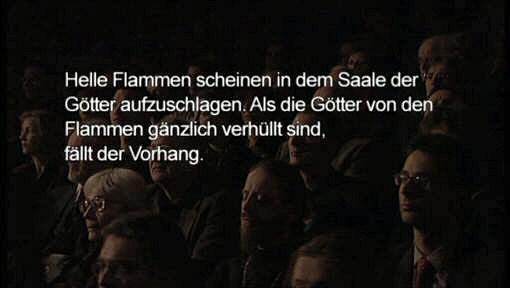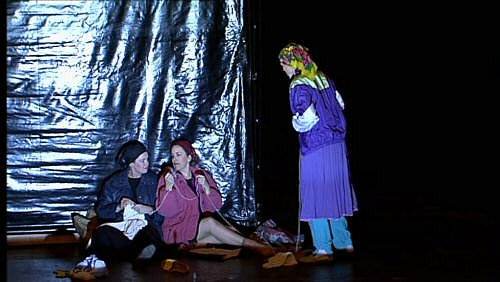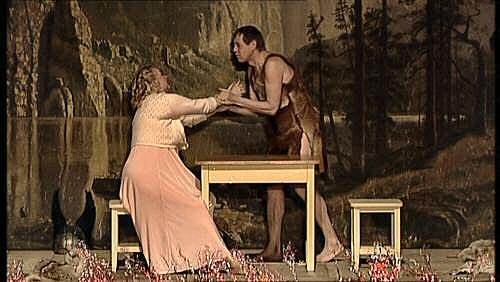
As those who read either
TH’s review of Rheingold
and Walküre or my own on Siegfried
might recall, Staatsoper Stuttgart’s
2002 Ring cycle had different directors
and casts for each part of the tetralogy.
Since I was critical of the ‘Siegfried’,
I read the booklet for these discs with
an eyebrow ready-raised in anticipation
of what I might find. No surprise then,
to learn that in directing ‘Götterdämmerung’
Peter Konwitschny felt ‘under no obligation
to draw together the threads of a holistic
concept of the work to override the
individual parts…’ And no surprise either,
that he sets ‘the action on the simple
wooden stage of a touring theatre company.’
To begin with the ending
so to speak, I should say at once that
Konwitschny reserves his really big
idea for the finale, where the audience
becomes part of the action. When Hagen
steps forward to take the Ring from
Siegfried’s finger in Act III, the house
lights come on and both Siegfried and
Gunther return to life. The cast then
leaves the stage until Brünnhilde
stands alone to sing the Immolation
music to the fully visible theatre.
As the drama closes, Wagner’s stage
directions appear behind her on a back-projected
screen. ‘The director refers us to the
score:’ the booklet says on this point,
‘read it, listen to it!’ Sound advice.

The rest of the staging
is a cross between the set for a medieval
mystery play and the Pyramus and Thisbe
episode in ‘A Midsummer Night’s Dream,’
with minimal props and heavy emphasis
on ‘messages.’ The Norns are a set of
bag-ladies slowly unpicking the web
of fate from a woolly jumper, Brünnhilde’s
rock is a badly painted mountain scene
kitted out with tinsel fire, and the
Gibichung Hall is a simple all-purpose
wooden structure with a stove and one
of those mirrored balls that used to
be found in dance-halls.
Everyone wears modern
dress except Siegfried, Alberich and
the Rhine Maidens. Brünnhilde is
in a nightdress covered by a cardigan
most of the time while Siegfried is
Fred Flintstone until he meets the sophisticated
Gibichungs. To show ‘some human warmth
from the dark character of Hagen,’ Alberich
dies at the end of the Watch scene and
turns up dressed in his shroud. He also
has spindly fingers to emphasise his
nastiness and shoes on his knees like
some Toulouse Lautrec. The Rhine Maidens
favour chiffon and the Gibichungs are
executives for Gibichungs Inc.

It quickly becomes
tedious, the frantic and pointed messaging.
Hagen bares his chest when summoning
the vassals because they’re all at a
sales meeting and we wouldn’t know how
tough they are otherwise. Siegfried
is stabbed with his own sword (Petard!
I hear you cry) and dies in the guilt-ridden
Gunther’s arms. Brünnhilde switches
from her nightie to a red crimplene
two-piece to deliver the dénouement.
Fluffy bunny no more, you see.
Even worse than this
though, is the insistence that the production
lets ‘Horror and comedy jostle each
other’. There’s a lot of stuff with
cake for instance. Gutrune bakes a cake
to welcome Brünnhilde to Gibichungsville
but the primitive Siegfried eats it.
When everything turns out badly of course,
more cake is ground into dust.
The fun never stops.
Not once. When Siegfried meets up with
the Rhinemaidens, to tease him they
hide a comedy bear he was chasing. Later,
they dress like the Norns to remind
him of his Fate and the bear holds up
the Norns’ jumper for emphasis. I found
myself longing for a concert performance.

Musically the production
meets the standards of a competent provincial
company, with decent though not outstanding
singing from most of the principals,
especially the Norns and Rhinemaidens.
Luan DeVol has a heavy vibrato but at
least can sing in tune. By contrast
Albert Bonnema and the notion of pitch
are not well acquainted. He improves
as the performance progresses but almost
always slides up to his higher notes
and at his worst relies on the quasi
– Sprechstimme adopted by Wagner
tenors who are struggling.
TH commented that the
Chéreau/Boulez Ring would be
his choice over the Stuttgart performances
that he reviewed, at least until the
Kupfer/Barenboim Bayreuth production
is released on DVD. Having the first
on DVD and the second on tape, I concur
completely.
Bill Kenny

